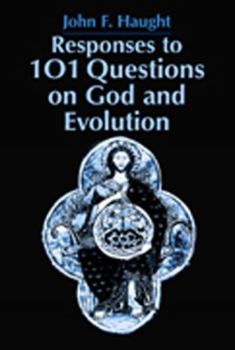Responses to 101 Questions on God and Evolution
Select Format
Select Condition 
Book Overview
Esteemed theologian John Haught brings his considerable experience to a controversial and thought-provoking topic: evolution. Writing within the formula of the well-known Responses to 101 Questions series, he gathers here questions that have arisen from conversations over the years with a variety of people--believers and scientific skeptics, those who embrace evolution and those who disdain it, and scholars and the scientifically uneducated. The questions...
Format:Paperback
Language:English
ISBN:0809139898
ISBN13:9780809139897
Release Date:September 2001
Publisher:Paulist Press
Length:160 Pages
Weight:0.52 lbs.
Dimensions:0.5" x 5.4" x 8.0"
Customer Reviews
2 ratings
A book for Inquiring Catholics, NOT for Dawkinsian Atheists!
Published by Thriftbooks.com User , 16 years ago
Apparently reviewer Haines doesn't know much about this series or its INTENDED audience. This is NOT a book of Christian Apologetics written to convince Atheistic Materialists of the existence of God (Haught's "Is Nature Enough?" is written more for that purpose, at least for showing the INADEQUACY of the "Scientism" of a Dawkins or a Dennett), so it shouldn't be judged as such. THIS book is published as part of the "Responses to 101 Questions" series from Paulist Press, a well-known Catholic publishing house. As such, it is written for INTERESTED, INQUIRING, LAY CATHOLICS (though Protestants should like it too), and so, for example, "proving the existence of God" is irreverent to the nature or goal of the book. Reviewer Haines is apparently UNAWARE of the series, and so, for some completely wacky reason becomes obsessed with Haught "writing his own 'softball' questions." The book was written for practicing Christians who are not scientists and who are wondering about things like, "Will Studying Darwin turn my son or daughter into an atheist?" "Is Darwinian Evolution compatible with Christian faith?" "What's wrong with 'Creationism' and Intelligent Design theory, and why is 'Whiteheadian Theistic Evolution' a BETTER option?" "How can contemporary Christians understand divine action in a world full of (what appears to be) random events and horrible animal suffering?" And so on. To this end, I personally found ALL the questions to be just the sort that the INTENDED audience would want answered. (And in this context, by the way, "citing Church Fathers as authorities" is a PERFECTLY acceptable move, not "a bad start," as Haines suggests.) Haines (and, for that matter, most of the so-called "new atheists")also seems COMPLETELY oblivious to the goals of MOST 20th and 21st century theology, namely to keep theology CURRENT by reflecting,adapting, and revising TRADITIONAL theology in light of insights from our CONTEMPORARY understanding of the world, as revealed by the biological, physical and social sciences. This is NOT, as Haines suggests, Haught "trying desperately to find God 'somewhere'," but simply a realization of the "historicist" nature of theology (Ancient and Classical theology was based on Ancient and Classical worldviews; Contemporary theology is based on CONTEMPORARY worldviews.) For Haught, Arthur Peacocke, David Griffin, John Polkinghorne, Ian Barbour, Gordon Kaufman, Karl Peters, and others, this means developing a "Theology of Evolution," or an "Evolutionary Theology." Why keeping one's theology CURRENT should be thought of as an "act of desperation" is beyond me! Why practicing Catholics should think the vision of an ANTI-Religious, Atheistic Materialist biologist like Dawkins is BETTER than the "integrated" vision of a Science-loving Catholic Theologian like Haught is also beyond me! Haines like to toss around the "S" word ("Supernaturalism"), but if reviewers like him ever BOTHERED to read any contemporary philosophy of
Christianity and evolution together at last.
Published by Thriftbooks.com User , 21 years ago
Theologian John F. Haught gives brief answers to 101 questions about the relationship between the Christian God and evolution, in which he explores an unusual middle path between creationist opposition to science and materialistic interpretations of the evolutionary process. Haught's stance is that evolution, understood in even the most robust Darwinian sense, is exactly the process we would expect the Christian God to institute in order to create life. Die-hard creationists will not like this book at all, and materialists (like me) will find Haught's reasons for rejecting a materialistic interpretation of evolution completely unconvincing (though he is certainly right to point out that the data does not interpret itself), but those who believe in both God and evolution will find many new and stimulating lines of thought in this book. All in all, although I disagreed with Haught's stance, I appreciated watching such a deep thinker work through such a novel position.






